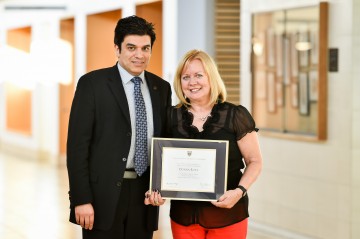![AD photo]() Hometown: Vancouver, BC
Hometown: Vancouver, BC
Undergrad University and major: UBC BSc. Integrated Sciences: International Health
Why did you want to become a doctor?
My undergraduate studies were rooted in the broader perspectives of health: how nutrition, political circumstances, country of origin or residence, cultural practice, and biological factors all integrate together to create a state of health or illness for individual people, communities, and countries. What brought me into medicine was the idea that health is bigger, broader than just one factor or one hospital, and I wanted to gain expertise in medicine to complete the picture of health and illness on the international scale I am interested in.
Are there any individuals who you look up to or aspire to be like in the medical field?
I have been so fortunate to truly stand on the shoulders of giants, benefiting from so much mentorship and guidance along this journey. I was especially fortunate to have done my clinical training at Kelowna General Hospital, and to all the docs there I owe a lot of my success. ER physicians especially were role models and mentors as I found my own passion and interest in the field. I hope to, one day, work with them as colleagues and emulate their kind bedside manner, their passion for medicine, their clinical acumen and especially their sense of humor and collegiality. One of my long-time mentors was actually my high school math teacher, who then went back to school to study medicine. Dr. Adjudani is now an R1 in Pediatrics at UBC! He’s always been a supportive friend and mentor, and taught all his students the value of hard work, commitment to a dream, and to always do your best in whatever task you have at hand. I hope to be an extraordinary teacher like he was for us in high school, and continues to be as a resident.
What has been the best part of your experience as a UBC medical student?
I have met some of my closest friends at UBC Medicine and even though we were separated at different sites, we went through all the highs and lows of this training together. It really is the people that make this journey so sweet, and be it long nights studying in the library, morning coffee breaks, or impromptu on-call run-ins in the halls, we supported each other through it all. These are friends I will keep forever. It’s a source of great pride to see my friends and classmates find their passions and achieve their dreams—I can’t wait to refer patients to them as colleagues in a few years! Knowing these people as well as I do, I really believe the future of medicine is in great hands.
What’s next for you? Where will you be doing your residency?
I definitely found my place in the pace, rigor, and excitement of the ER, and am so excited to be starting my residency training in Emergency Medicine. I’m going to be heading to Toronto and training at some of the biggest hospitals in Canada. Beyond the ER I’m looking forward to learning more about inner-city health, global health, and social media in medicine; I am excited to not only train in “the big city,” but also to expand my knowledge and expertise in a variety of areas in and around Emergency Medicine. I’ll definitely miss living in beautiful BC!
What excites you the most about your future as a doctor?
Emergency Medicine really feels like a great fit for me. I have a broad array of interests, including global health, inner city health, addictions medicine, health advocacy, and social media. The Emergency Department is the frontline in combating suffering and inequity; you can tell so much about a community by looking at the people in the ER and the circumstances that bring them there. The ER is where people’s social circumstances—like hunger, poverty, safety—and their health needs intersect, and it is where the social and community issues affecting individuals and families really become a part of a person’s care. I am drawn to Emergency Medicine for the opportunity to think in parallel–to provide acute care medicine in the context of healthcare innovation and social change. Medicine, especially Emergency Medicine, is extremely portable, and there are so many ways to apply my training in countries and communities around the world: I hope to take what I learn in residency training locally, and make an impact here in Canada, and globally.













